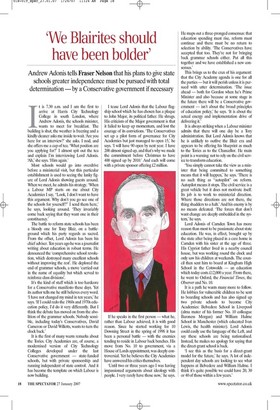'We Blairites should have been bolder'
Andrew Adonis tells Fraser Nelson that his plans to give state schools greater independence must be pursued with total determination — by a Conservative government if necessary 1 t is 7.30 a.m. and I am the first to arrive at Harris City Technology College in south London, where Andrew Adonis, the schools minister, wants to meet for breakfast. The building is shut, the weather is freezing and a kindly cleaner asks me inside to wait. Are you here for an interview?' she asks. I nod, and she offers me a cup of tea. 'What position are you applying for?' I almost spit out the tea and explain I'm interviewing Lord Adonis. Ah,' she says. 'Him again.'
Most schools would go into overdrive before a ministerial visit, but this particular establishment is used to seeing the lanky figure of Lord Adonis showing guests around. When we meet, he admits his strategy. 'When a Labour MP starts on me about City Academies I say, "Look, I don't want to have this argument. Why don't you go see one of the schools for yourself?" I send them here,' he says, looking around. 'They invariably come back saying that they want one in their constituency.'
The battle to reform state schools has been a bloody one for Tony Blair, on a battleground which his party regards as sacred. From the offset, Lord Adonis has been his chief adviser. Ten years ago he was a journalist writing about education in robust terms. He denounced the 'comprehensive school revolution, which destroyed many excellent schools without improving the rest'. He deplored the end of grammar schools, a move 'carried out in the name of equality but which served to reinforce class divisions'.
It's the kind of stuff which is too hardcore for a Conservative manifesto these days. Yet its author tells me he still believes every word. 'I have not changed my mind in ten years,' he says. 'If I could redo the 1960s and 1970s education policy, I'd do it very differently. But I think the debate has moved on from the abolition of the grammar schools. Nobody sensible, including today's Conservatives, David Cameron or David Willetts, wants to turn the clock back.'
It is the first of many warm remarks about the Tories. City Academies are, of course, a modernised version of City Technology Colleges developed under the last Conservative government — state-funded schools, but with private sponsorship and running independent of state control. And it has become the template on which Labour is now building.
I tease Lord Adonis that the Labour flagship school which he has chosen has a plaque to John Major, its political father. He shrugs. His criticism of the Major government is that it failed to keep up momentum, and lost the courage of its convictions. 'The Conservatives set up a pilot form of governance for City Academies but just managed to open 15,' he says. 'I will have 90 open by next year. I have 200 almost signed up, and that's why we made the commitment before Christmas to have 400 signed up by 2010.' And each will come with a private sponsor offering £2 million If he speaks in the first person — what he, rather than Labour achieved, it is with good reason. Since he started working for 10 Downing Street in the spring of 1998 it has been a personal battle — with the enemies tending to reside in Labour back benches. His move from No. 10 to government, via a House of Lords appointment, was deeply controversial. Yet he believes the City Academies have answered his critics themselves.
'Until two or three years ago I was having impassioned arguments about ideology with people. I very rarely have those now,' he says.
He maps out a three-pronged consensus: that education spending must rise, reform must continue and there must be no return to selection by ability. 'The Conservatives have accepted that too. They're not for bringing back grammar schools either. Put all this together and we have established a new consensus.'
This brings us to the crux of his argument: that the City Academy agenda is one for all the parties — but it will perish unless it is pursued with utter determination. 'The issue ahead — both for Gordon when he's Prime Minister and also because at some stage in the future there will be a Conservative government — isn't about the broad principles of education policy,' he says. 'It is about the actual energy and implementation drive of delivering it.'
It is always striking when a Labour minister admits that there will one day be a Tory administration. But Lord Adonis knows that he is unlikely to outlive the Blair era and appears to be offering his blueprint as much to the Tories as to the Chancellor. He main point is a warning: not to rely on the civil service to transform education.
'You simply cannot take the view as a minister that being committed to something means that it will happen,' he says. 'There is no such thing as "autopilot" on reform. Autopilot means it stops. The civil service is a great vehicle but it does not motivate itself. Its job is to work to ministerial direction. Where those directions are not there, the thing shudders to a halt.' And his enemy is by no means defeated. 'The forces that don't want change are deeply embedded in the system,' he says.
Lord Adonis of Camden Town has more reason than most to be passionate about state education. He was, in effect, brought up by the state after being placed in a care home in Camden with his sister at the age of three. His Cypriot father lived in a nearby council house, but was working round the clock and only saw his children at weekends. The council then sent him to board at Kingham High School in the Cotswolds — an education which today costs £12,000 a year. From there, he went to Oxford, the Financial Times, the Observer and No. 10.
It is a path he wants many more to follow. He lobbies for vulnerable children to be sent to boarding schools and has also signed up two private schools to become City Academies: Belvedere School in Liverpool (alma mater of his former No. 10 colleague Baroness Morgan) and William Hulme School in Manchester (which educated Ivan Lewis, the health minister). Lord Adonis could easily use the language of the Left, and say these schools are being nationalised. Instead, he makes no apology for saying that the direct-grant school is back.
'I see this as the basis for a direct-grant model for the future,' he says. 'A lot of independent day schools are looking to see what happens at Belvedere and William Hulme. I think it's quite possible we could have 20, 30 or 40 of those within a few years.'
We're halfway into the interview, and I have only asked five questions. I hardly needed to ask any. Lord Adonis speaks with the passion of an evangelist and the speed of a horse-racing commentator; he manages (I timed it later) 255 words per minute. It is as if he is trying to do and say as much as he can before the Brownite guillotine descends. He talks about his plans to write a book on his hero, Roy Jenkins, and perhaps one on his time in government.
'My critique of the Blair years — and I'll be writing a book in due course about it — will be that we had all of the right ideas but we could have been constantly bolder with the pace of implementation.' But he did as much as the Labour party would let him 'I think we went to the limits of what was possible at any one time.' This raises the question: would a Conservative government find it easier to implement?
He certainly sees no conflict between his agenda and Conservative principles — and again emphasises the common ground. 'Everybody talks about Tony Blair saying "Education, education, education"; he says. 'But I thought John Major's response was equally significant. He said: "I have the same three priorities, but not necessarily in the same order." And today, that is basically what Blair and Cameron are saying to each other. What a fantastic thing for the country.'
We tour the school afterwards. Lord Adonis must have seen it scores of times before, but he is still drooling. He points out innovations: noticeboards publish children's exam results fortnightly, inspiring low performers to do better. Healthy chicken wraps are prepared for lunch. The headmaster explains the boom in demand for other Harris City Academies opening in London: the brand name works. 'We hear from pupils grateful they could get a place, and saying how they were envied by their other friends from primary school.'
The tragedy is that Harris City Academy is so utterly unrepresentative of the nation's 3,500 state schools. And, after nine years on the inside of government, Lord Adonis knows that Labour has not transformed a system but planted a seed. And he pleads for whoever comes next — Mr Brown or Mr Cameron — to let it grow.















































 Previous page
Previous page